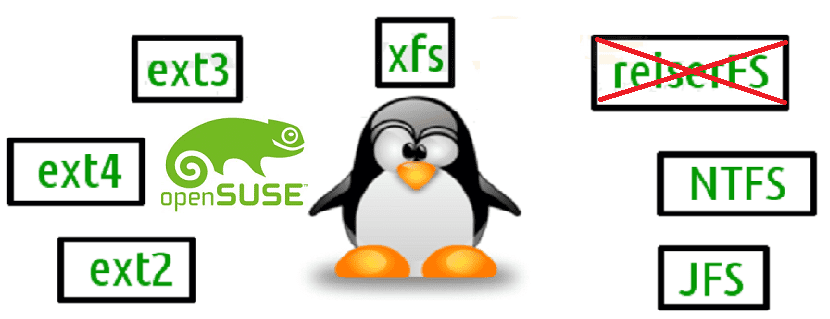
reiserfs became officially classified as obsolete
Late last year we share the news here on the blog about the proposal presented by Jeff Mahoney, director of SUSE Labs, in which basically it was asking to remove support for the ReiserFS filesystem from openSUSE.
The main reason to remove ReiserFS is because support was stopped to this file system and therefore it is considered obsolete, in addition to the fact that it no longer makes sense to continue maintaining the code of something that has stopped receiving support for several years.

Y even though it was a file system that was used for a long time on various Linux-based operating systems, such as SUSE Linux, ReiserFS stood out for its efficiency in handling large quantities of small files, The system is currently obsolete.
The reasons why the creator of this file system, Hans Reiser, is not something we will touch on in this article, but we can only mention that due to "those issues" that became problems for the author, ReiserFS no longer had a way in front.
In addition, the tools that Jeff maintains were last updated five years ago, while ReiserFS 3 in the kernel is similar and ReiserFS 4, which Edward Shishkin worked on, shows some activity with the development of Reiser5 which is stated to be There are no inherent disadvantages to FS+RAID/LVM combinations and non-parallel file systems (ZFS, Btrfs), such as free space issue, performance degradation when volume fills. Although the problem is that the development of the FS and the activity of Edward Shishkin has not stood out much, it has been almost non-existent since last year.
And that is why now information about the change has been released which has been implemented on the basis of code on which the Linux 6.6 kernel is based, moving the ReiserFS file system implementation from the supported category to obsolete.
With it ReiserFS move to the «Obsolete» label in the fusion of the Linux 6.6″ cycle, since currently, it is considered that there are various solutions that are more modern and widely used that displace the use of ReiserFS, including the ext4, Btrfs, XFS file systems, among others.
After the proposal presented last year, the issue of removing the ReiserFS file system from the Linux kernel led to the addition of a note to kernel 5.18 about the deprecation of ReiserFS and with it the intention to stop supporting it until 2025 and a recommendation to migrate existing ReiserFS file system to environments with btrfs, xfs or ext4.
The stated reason for deprecating ReiserFS was the desire to reduce the effort required to maintain filesystem-wide changes related to support for the new API for mounting, iomaps, and folios.
Among the problems with ReiserFS, too stagnation was mentioned that accompanies this file system, the unsolved problem of 2038 and the lack of fault tolerance capabilities that modern file systems offer to protect against damage in the event of failure or compromise.
The ReiserFS user base is estimated to be small and declining. The last major distribution that supported ReiserFS was openSUSE, but a year ago the openSUSE developers stopped supporting this FS in the Tumbleweed repository (SUSE stopped supporting ReiserFS 5 years ago).
Finally, we only have to recommend that those who use this file system migrate to another more modern file system that has active support, since after the release of the Linux Kernel version 6.6, ReiserFS support will move to a stage in which which will be phased out of Linux in future versions.
If you are interested in knowing more about it, you can see the notes about changes being made to the Linux 6.6 code base in the following link